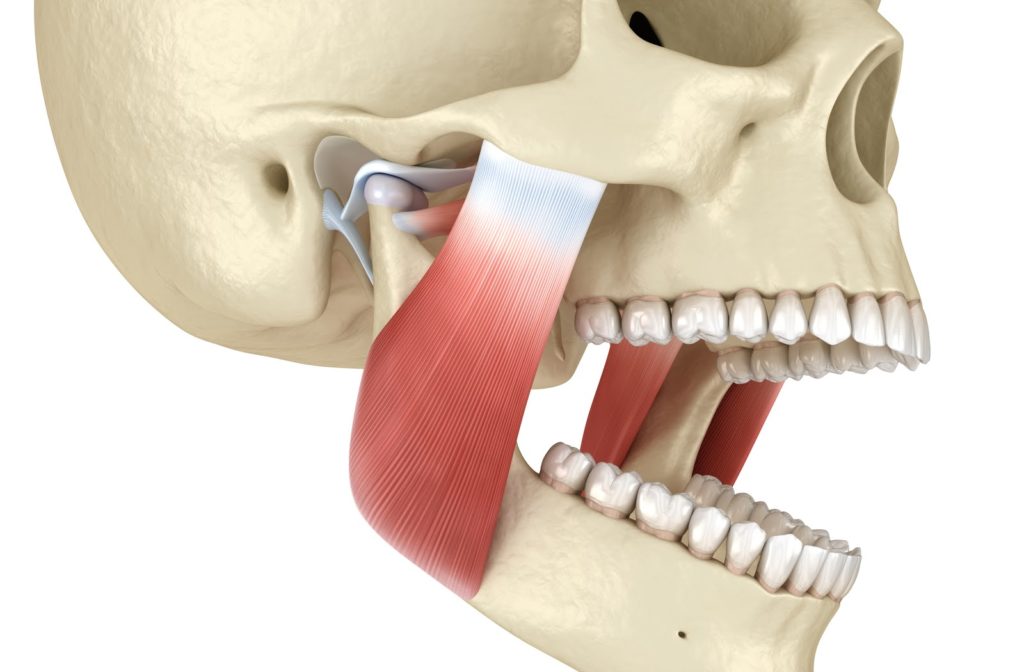Neck pain can make even the simplest daily tasks into tedious challenges. Many people don’t even know where their neck pain is coming from, making matters even more complicated. For instance, what if we told you the pain in your neck might result from temporomandibular joint (or TMJ) disorder?
Not sure what TMJ is or what it has to do with your neck? Not to worry; our dental specialists know all about TMJ, and we’re ready to make it make sense. Read on to determine whether TMJ might be the culprit behind your neck pain and what to do if it is.
What is TMJ, Anyway?
The temporomandibular joint connects your skull to your jawbone. You have two such joints: one on either side of your face. However, these joints can be worn out or damaged in numerous ways, including:
- Jaw injuries
- Habitually clenching or grinding the teeth (especially at night)
- Habitually chewing gum
- Stress
- Arthritis
- Poor posture
TMJ most often occurs for one of these reasons. However, it can also appear in people who have not experienced any of the conditions listed above. We use our jaws a great deal each day, and sometimes the joints simply stop working correctly.

Other TMJ Symptoms
Neck pain is related to TMJ about 70% of the time. However, it isn’t the only kind of discomfort TMJ can cause. If you have TMJ, you could also experience any of the following symptoms:
- General pain or increased sensitivity in your jaw
- Specific, localized pain in either of your temporomandibular joints
- Aches and pains near one or both ears
- Pain or difficulty when chewing food
- Aches and pains in other parts of the face
- “Locking” of the jaw, which can prevent you from opening (or closing) your mouth
Neck pain isn’t even the most common TMJ symptom, which is why you might not assume there’s a connection between the two. However, if any other common TMJ symptoms accompany your neck pain, you may have found the reason for your discomfort. Consulting your dentist is the easiest way to determine whether you actually have TMJ and choose a plan of action to deal with it.
How TMJ Relates to Neck Pain
The discomfort that comes with TMJ is often the result of inflammation in the affected joint. However, this inflammation can spread beyond the joint itself, eventually affecting nearby muscles, nerves, and blood vessels.
Once inflammation begins to spread elsewhere, the pain caused by TMJ can be somewhat unpredictable. It may occur in areas that seem unrelated to the jaw itself and may appear sporadically.
People who experience pain from TMJ in their neck muscles might confuse it with general muscle tension. That’s because the pain typically does not involve redness or swelling, even though it stems from an inflammatory issue.
Additional Signs that Your Neck Pain is Related to TMJ
Even if you do not experience other symptoms, there are still a few ways to tell whether TMJ could be causing your neck pain. Ask yourself the following questions:
- Does your neck pain become more severe when you are using or moving your jaw? Likewise, do you find that your neck pain decreases or subsides when the jaw is resting? If you answered yes to either question, TMJ could be causing your neck pain.
- Is your neck pain on the same side of your body as your affected jaw? If so, the two might be related. This question only applies to people who already know they have TMJ but aren’t sure whether it could explain their neck pain.
What to Do if You Suspect TMJ is Behind Your Neck Pain
If you have reason to believe that TMJ could be causing your neck pain, we recommend visiting your dentist as soon as possible. Our dentists have extensive experience helping patients who are suffering from TMJ and will be happy to help you choose a course of treatment for your symptoms.
Mild cases of TMJ may simply cause a clicking or popping noise when moving the jaw and may not come with other symptoms. These cases usually do not require treatment unless they start to cause more severe symptoms down the road.
If your TMJ is causing neck pain or other forms of discomfort, a range of options may be available. They include everything from over the counter painkillers to surgeries that can correct your TMJ permanently.
Taking Your Life Back from TMJ
Neck pain is just one of the challenges that you may face if you have TMJ, but you don’t have to let it significantly impact your life. Contact us today and find out how we can help you manage your neck pain or other TMJ symptoms.


